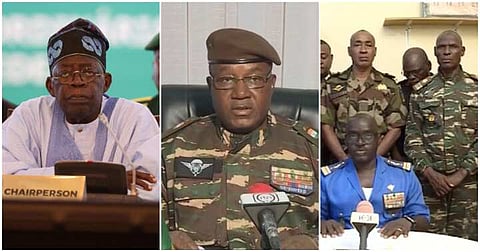

President Tinubu, the leader of ECOWAS, has issued a stern warning, threatening a military invasion of Niger if the military junta does not step down. The situation has raised the specter of a potential armed conflict between the two neighboring countries.
Here are five critical factors that warrant careful consideration should Nigeria and Niger engage in military combat:
1. Military Rankings: According to the Global Firepower rankings of 2023, Nigeria's military is ranked 36th globally, while the Nigerian army holds the 119th position. Nigeria stands at an impressive fourth place on the African scene, whereas Niger holds the 25th spot.
2. Military Personnel: Nigeria boasts a substantial total of 215,000 military personnel, with 135,000 of them being active. Additionally, Nigeria has over 85,000 personnel fit for service and 80,000 paramilitaries. In contrast, Niger's active military personnel is limited to a mere 10,000, with no reserves.
3. Defence Budget: In terms of financial resources, Niger pales in comparison to Nigeria. While Nigeria's defense budget exceeds $3 billion, Niger's defense budget is a modest $287 million. Nigeria's purchasing power parity towers at over $1 trillion, while Niger's stands at just $28 billion.
4. Armed Artillery: As of 2023, Nigeria possesses significant firepower, with 177 tanks, 15,748 armored vehicles, 30 self-propelled artillery units, 338 towed artillery pieces, and 37 rocket projectors. On the other hand, Niger's military arsenal is comparatively limited, with no tanks, only 728 armored vehicles, and no self-propelled or towed artillery.
5. Air Power: Nigeria's air force holds an impressive fleet of 144 combat aircraft, including 14 fighter jets, 28 trainer jets, 52 helicopters, and six special mission jets, among others. In stark contrast, Niger possesses only 16 military aircraft.
As the situation unfolds, it is crucial for both Nigeria and Niger to prioritize diplomatic channels and peaceful negotiations to find a resolution.
A military confrontation between these two nations could have severe consequences for the entire region. The international community, including ECOWAS, must continue its efforts to mediate and seek a peaceful resolution to prevent further escalation.
